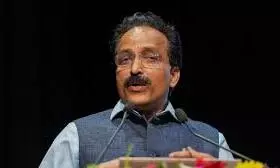
India's Gaganyaan mission set for late 2026, ISRO confirms
text_fieldsThe Indian Space Research Organisation (ISRO) has announced plans to launch its ambitious Gaganyaan mission, the country's first crewed spaceflight, by the end of 2026.
According to ISRO Chairman S. Somanath, the project’s first uncrewed test flight is now scheduled for early next year, marking a significant milestone in India's space exploration journey.
The Gaganyaan mission seeks to showcase India's capability to send humans into space, targeting a three-day orbital mission 400 kilometers above Earth. Following their time in orbit, the astronauts will safely return with a landing in Indian Ocean waters. If successful, India will join a group of nations - after the Soviet Union, the United States, and China - to achieve this feat.
The estimated cost of the indigenous project is ₹90 billion. "We have been working on Gaganyaan for the past four years, and our rocket is fully prepared," said Somanath at an event at IIT-Guwahati.
Before the crewed mission, ISRO plans three test flights, starting with a mission that will carry a robotic passenger named Vyommitra. The first uncrewed flight is set for early 2024, delayed slightly from its initial December 2023 target due to technical challenges. "Once the three test launches are completed successfully, we will proceed with the manned mission. All astronauts have been trained and are ready," said Somanath.
In February, Prime Minister Narendra Modi introduced the four astronauts for the mission: Group Captains Prasanth Balakrishnan Nair, Angad Pratap, Ajit Krishnan, and Wing Commander Shubhanshu Shukla.
ISRO is also preparing for Chandrayaan 4, which will focus on collecting samples from the Moon's south pole and returning them to Earth. Following the success of Chandrayaan 3, this mission aims to advance lunar exploration technology.
"This mission involves unique challenges. Since the payload for the Moon is heavier, we plan to execute two launches, where the satellites will interlock in space," Somanath explained.
If successful, India will be the first country to execute such a complex maneuver. "This will demonstrate the capability to retrieve lunar samples and return to Earth - a feat no other nation has attempted," he added.























